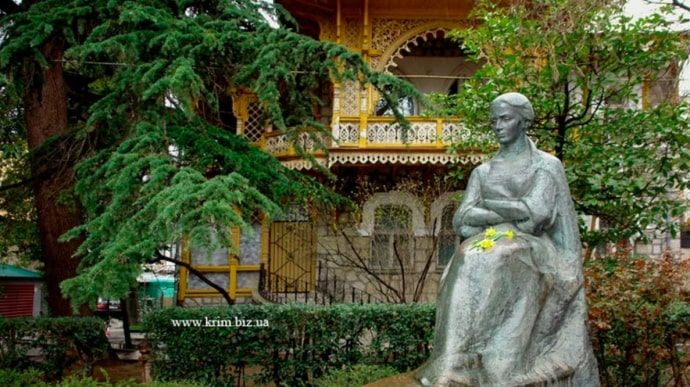The Lesia Ukrainka Museum in Yalta, located in occupied Crimea, has been effectively erased. Lesia Ukrainka was a notable Ukrainian writer, poet, and activist for Ukrainian freedom, independence, and identity. The building where the museum once stood now displays a plaque from Soviet times mentioning Lesia Ukrainka, but all other references to her have been removed by Russian authorities. The museum has been repurposed under a new name, the Yalta Historical and Literary Museum, with exhibitions focusing on Yalta’s history, music, and literature, as well as architect Nikolai Krasnov. The fate of the original exhibits dedicated to Lesia Ukrainka is uncertain, with concerns that they may have been archived, relocated, or possibly destroyed. This is part of a broader trend of Russian authorities destroying or repurposing cultural institutions in Crimea and Ukraine as a whole. Dmitry Rogozin, a Russian official heading the Russian occupation of Zaporizhzhia Oblast, said on June 27 that it is “time to burn everything Ukrainian down to the root” so that “there is no trace left.”
Simultaneously, as Russian armed forces target and destroy Ukraine’s cultural heritage with missiles, rockets, and artillery, Kyiv’s developers are bulldozing historic buildings right in the city center. On July 19, videos and images surfaced of the historic Zelensky Manor being ripped apart by a bulldozer. This juxtaposition highlights the dual threats facing Ukraine’s cultural heritage – one from external military aggression and the other from internal development projects. The destruction of historic buildings and monuments in Kyiv adds to the loss of cultural identity and historical significance, compounding the challenges already faced by the country in preserving its rich heritage. The Zelensky Manor, a significant historical site, falling victim to demolition underscores the need for greater awareness and protection of Ukraine’s cultural treasures against both external and internal threats.
The erasure of the Lesia Ukrainka Museum in Yalta and the demolition of the Zelensky Manor in Kyiv are emblematic of the broader assault on Ukraine’s cultural heritage. These actions demonstrate a deliberate attempt to undermine Ukrainian identity, history, and memory by both external aggressors and internal forces. The destruction and repurposing of cultural institutions and historic sites not only erase tangible pieces of Ukraine’s past but also diminish the country’s cultural resilience and sense of national pride. As both Russia’s occupation and internal development projects continue to threaten Ukraine’s cultural heritage, there is a pressing need for concerted efforts to safeguard and protect these valuable assets for future generations.
The loss of the Lesia Ukrainka Museum and the Zelensky Manor represents not just physical destruction but also the erasure of narratives and memory that are integral to Ukraine’s cultural fabric. By targeting cultural institutions and historic sites, both Russia’s military aggression and internal development projects aim to weaken Ukraine’s sense of national identity and historical continuity. The deliberate destruction of tangible symbols of Ukrainian culture serves to disrupt connections to the past and erode the collective memory of the Ukrainian people, impacting their ability to understand and celebrate their heritage. Preserving and defending these cultural landmarks is crucial in the face of ongoing threats that seek to silence Ukraine’s voice and distort its history.
The international community must recognize the importance of supporting independent journalism and advocacy efforts in Ukraine to raise awareness about the threats facing the country’s cultural heritage. By amplifying the voices of those working to protect Ukraine’s cultural treasures and uphold its historical legacy, the global community can contribute to efforts to preserve and defend these vital aspects of Ukrainian identity. Solidarity with Ukraine in the face of external aggression and internal challenges is essential in safeguarding the country’s cultural heritage for future generations. Through collective action and advocacy, we can stand in solidarity with Ukraine and support its efforts to protect and preserve its rich cultural legacy from destructive forces seeking to erase its history and identity.


